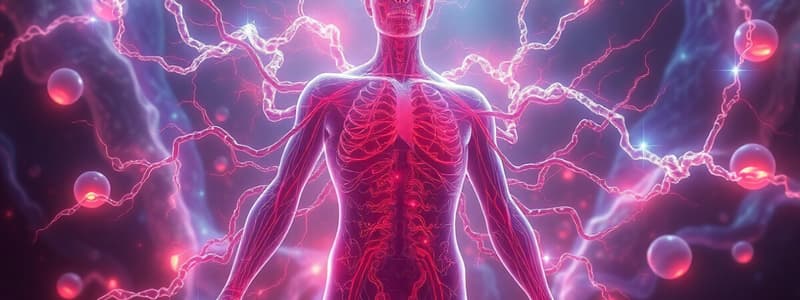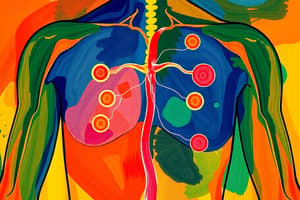Podcast
Questions and Answers
What is the primary function of phagocytes in the immune response?
What is the primary function of phagocytes in the immune response?
- To monitor T-cells
- To engulf and destroy foreign pathogens (correct)
- To produce antibodies
- To activate B-cells
Which type of cell is NOT a type of phagocyte?
Which type of cell is NOT a type of phagocyte?
- Monocyte
- B-cell (correct)
- Macrophage
- Neutrophil
What role do Helper T-cells play in the immune system?
What role do Helper T-cells play in the immune system?
- Recruit B-cells for pathogen identification (correct)
- Monitor positive immune responses
- Directly kill infected cells
- Produce antibodies
What do memory B-cells do after an initial infection?
What do memory B-cells do after an initial infection?
Which statement accurately describes the role of Suppressor T-cells?
Which statement accurately describes the role of Suppressor T-cells?
What is the primary reason elderly people have a weaker immune system compared to younger individuals?
What is the primary reason elderly people have a weaker immune system compared to younger individuals?
What does the ABO system determine?
What does the ABO system determine?
What occurs during agglutination?
What occurs during agglutination?
In which scenario does a Rh- mother produce antibodies against Rh+ blood?
In which scenario does a Rh- mother produce antibodies against Rh+ blood?
What can trigger an allergic reaction in the immune system?
What can trigger an allergic reaction in the immune system?
What is the role of antihistamines?
What is the role of antihistamines?
How is HIV primarily transmitted?
How is HIV primarily transmitted?
What treatment might a baby require if it experiences clumping of blood due to Rh incompatibility?
What treatment might a baby require if it experiences clumping of blood due to Rh incompatibility?
What is the primary function of the lymphatic system?
What is the primary function of the lymphatic system?
Which component of the human defense system identifies and neutralizes pathogens?
Which component of the human defense system identifies and neutralizes pathogens?
Which fluid is collected by the lymphatic system?
Which fluid is collected by the lymphatic system?
What is the role of macrophages in the lymph nodes?
What is the role of macrophages in the lymph nodes?
What type of barrier is the skin considered in the immune system?
What type of barrier is the skin considered in the immune system?
What substances stimulate the formation of antibodies?
What substances stimulate the formation of antibodies?
What causes swelling of lymph glands during an infection?
What causes swelling of lymph glands during an infection?
Which component is NOT part of the first line of defense against pathogens?
Which component is NOT part of the first line of defense against pathogens?
What is the primary role of plasma cells in the immune response?
What is the primary role of plasma cells in the immune response?
How do antibodies contribute to immune defense?
How do antibodies contribute to immune defense?
What triggers the body to launch an immune response during vaccination?
What triggers the body to launch an immune response during vaccination?
What is the function of Helper T-cells in the immune response to vaccines?
What is the function of Helper T-cells in the immune response to vaccines?
What is the significance of antibodies remaining in the bloodstream?
What is the significance of antibodies remaining in the bloodstream?
What happens to antibodies over time after vaccination?
What happens to antibodies over time after vaccination?
What defines antibody-mediated immunity?
What defines antibody-mediated immunity?
Why might people feel sick after receiving a vaccine?
Why might people feel sick after receiving a vaccine?
Flashcards
What are phagocytes?
What are phagocytes?
A group of white blood cells that engulf and destroy foreign invaders. They prevent the spread of infection by consuming harmful pathogens such as bacteria and viruses.
What is the second line of defense?
What is the second line of defense?
A type of non-specific immunity involving the inflammatory response, where white blood cells like phagocytes work to fight off infections. It's the body's second line of defense against foreign invaders.
What are lymphocytes?
What are lymphocytes?
Specific white blood cells responsible for targeted attack against invaders, using specialized recognition and destruction methods.
What is a killer T-cell?
What is a killer T-cell?
Signup and view all the flashcards
What is a memory B-cell?
What is a memory B-cell?
Signup and view all the flashcards
Immunity
Immunity
Signup and view all the flashcards
Antibodies
Antibodies
Signup and view all the flashcards
Antigens
Antigens
Signup and view all the flashcards
Antibody-mediated immunity
Antibody-mediated immunity
Signup and view all the flashcards
Vaccine
Vaccine
Signup and view all the flashcards
Helper T-cells
Helper T-cells
Signup and view all the flashcards
B-cells
B-cells
Signup and view all the flashcards
Plasma cells
Plasma cells
Signup and view all the flashcards
Lymphatic System
Lymphatic System
Signup and view all the flashcards
Lymph Fluid
Lymph Fluid
Signup and view all the flashcards
First Line of Defense
First Line of Defense
Signup and view all the flashcards
Pathogen
Pathogen
Signup and view all the flashcards
Macrophages
Macrophages
Signup and view all the flashcards
Blood transfusion
Blood transfusion
Signup and view all the flashcards
Blood groups
Blood groups
Signup and view all the flashcards
ABO system
ABO system
Signup and view all the flashcards
Agglutination
Agglutination
Signup and view all the flashcards
Rhesus (Rh) Factor
Rhesus (Rh) Factor
Signup and view all the flashcards
Rhesus (Rh) Factor and Pregnancy
Rhesus (Rh) Factor and Pregnancy
Signup and view all the flashcards
Allergies
Allergies
Signup and view all the flashcards
Acquired Immune Deficiency Syndrome (AIDS)
Acquired Immune Deficiency Syndrome (AIDS)
Signup and view all the flashcards
Study Notes
Lymphatic System and Immunity
- The lymphatic system works with the circulatory system to protect the body from infection
- The blood, specifically white blood cells, also plays an important role in immunity
- The lymphatic system is a network of vessels, glands, and nodes spread throughout the body
- Lymph fluid, similar to blood plasma, is collected by the lymphatic system
- Lymph helps maintain fluid balance in the body by bathing cells, mixing with general blood circulation.
Human Defense System
- The first line of defense is to prevent organisms from entering the body
- Skin and mucus lining respiratory passages prevent most microbes
- Stomach acids, oils in skin, and enzymes in tears break down bacteria
Important Terms
- Antigen: A protein that stimulates antibody formation
- Antibody: A protein in blood that reacts with an antigen
- Pathogen: An organism that causes disease in a host
The Lymphatic System and Immunity
- Lymph nodes are where white blood cells mature
- Lymph nodes also contain macrophages (white blood cells that trap and destroy bacteria)
- Infections can lead to an increase in macrophages, causing lymph glands to swell.
Immunity (First Line of Defense)
- Physical and chemical barriers of the body, including skin, stomach acid, eyelashes, tears, and cilia, protect from foreign invaders.
Immunity (Second Line of Defense)
- Involves non-specific white blood cells called phagocytes, that engulf and destroy foreign pathogens in the bloodstream
- Also referred to as the inflammatory response, often resulting in swelling and fever
- Three types of phagocytes: monocytes, macrophages, and neutrophils
- Phagocytes destroy harmful pathogens through phagocytosis, a process of engulfment.
Immunity (Third Line of Defense)
- Also known as antibody-mediated immunity
- Lymphocytes (specific white blood cells) target pathogens based on specific markers
- B-cells and T-cells are types of lymphocytes
- Antibodies, a type of protein, are produced to help destroy pathogens.
T-Cells
- Helper T-cells analyze pathogens after phagocytosis and recruit B-cells.
- Killer T-cells destroy virus-infected and cancerous cells.
- Suppressor T-cells monitor killer T-cells, preventing them from harming healthy tissues.
B-Cells
- B-cells are recruited to the site of phagocytosis by T-cells
- B-cells divide into memory B-cells and plasma cells
- Memory B-cells display antibodies to quickly identify pathogens
- Plasma cells produce large amounts of antibodies to target specific pathogens.
Specific Defenses (Antibody-Mediated Immunity)
- The third line of defense is antibody-mediated immunity
- Antibodies recognize foreign substances and either neutralize or destroy them
- Lymphocytes are responsible for this immune response
- The body distinguishes "self" from "non-self" proteins and molecules
The Immune Response
- Phagocytes present pathogen antigens to helper T-cells
- Helper T-cells activate B-cells, producing antibodies
- Killer T-cells destroy infected or cancerous cells
- Suppressor T-cells regulate the immune response
Antibodies
- Antibodies are proteins in the bloodstream that recognize antigens
- They trigger a series of events to neutralize or destroy pathogens
- Antibodies are specific to different pathogens and are generated after their destruction by white blood cells
Blood Types
- Blood transfusion involves transferring blood from one person to another
- Different blood groups exist due to different red blood cell antigens
- The ABO system determines blood type based on A, B antigens
- Agglutination is the clumping of red blood cells due to incompatible blood types.
Blood Groups - How They Work
- Blood types are based on antigens and antibodies
- Blood type A has A antigens and B antibodies
- Blood type B has B antigens and A antibodies
- Blood type AB has both A and B antigens and neither A nor B antibodies
- Blood type O has neither A nor B antigens and both A and B antibodies
Rhesus (Rh) Factor
- Rh factor is a second antigen found on red blood cells
- People can be either Rh+ or Rh-
- Rh- individuals produce antibodies when exposed to Rh+ blood during transfusions or pregnancy causing problems for Rh+ fetuses during subsequent pregnancies.
Rhesus Factor and Pregnancy
- If a Rh- mother carries an Rh+ fetus, antibodies might be produced against the fetal blood cells
- This can cause problems for the fetus
- Treatment for this issue often involves a blood transfusion for the child.
Allergies
- Allergies occur when the immune system mistakenly recognizes harmless foreign particles as threats
- This causes an immune response leading to sneezing, runny nose, watery eyes.
- Antihistamines can alleviate these symptoms by blocking histamine effects.
Acquired Immune Deficiency Syndrome (AIDS)
- AIDS is caused by the Human Immunodeficiency Virus (HIV)
- HIV is transmitted through bodily fluids like blood or through unprotected sex
- HIV specifically targets and kills T-cells, crippling the immune system
- The virus itself doesn't immediately kill but prevents the immune system from functioning effectively.
Studying That Suits You
Use AI to generate personalized quizzes and flashcards to suit your learning preferences.




